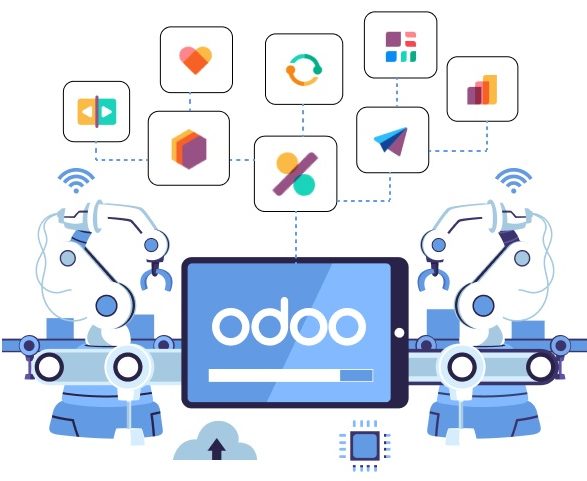Odoo ERP FOR
MANUFACTURING INDUSTRY
Automate production workflows, optimize inventory, access real-time insights.

Years of Experience

Implementations

Satisfaction Rates

Odoo ERP is an all-in-one solution for managing production in the manufacturing industry. It automates BOM management and ensures precise assembly instructions. The ERP provides real-time tracking of raw materials and finished goods. It prevents stockouts and overproduction. Odoo ERP enhances production schedules, allows manufacturers to optimize resource allocation, and minimizes downtime. Its integrated quality control features ensure that products meet regulatory requirements. Odoo supports maintenance management, and the ERP’s reporting tool provides actionable insights for continuous improvement.
150+
Odoo
Technologists
200+
Successful
Implementations
10+
Years of Domain
experience
95%
Customer
Satisfaction Rates
150+
Odoo
Technologists
200+
Successful
Implementations
10+
Years of Domain
experience
95%
Customer
Satisfaction Rates
Odoo ERP Services for manufacturing Industries
Consulting
- Strategic Platform Selection/Integration
- Omnichannel Implementation
- Performance Optimization
Implementation
- Custom Development/Integration
- Secure Payment Gateway & Data Mgmt
- Performance Tuning
Customization
- Tailored User Experience
- Advanced Workflow Automation
- Integrations and Extensions
Maintenance
- Regular Security Updates
- Performance Monitoring/Optimization
- Feature Enhancements & Bug Fixes
Upgradation
- Seamless Version Updates
- Compatibility Checks & Testing
- User Training & Documentation
Training
- Hands-On Platform Training
- Custom Workflow & Process Training
- Continuous Learning and Support
Integration
- Streamlined design-to-production workflows
- Automation through connected machinery
- Real-time production with MES
Migration
- Data Integrity and Security
- Platform Compatibility & Testing
- SEO & Performance Mgmt
Support
- 24/7 Technical Assistance
- Proactive System Monitoring & Testing
- Tailored Support Solutions
Our Clients
Integration for manufacturing industry

PPAP
PPAP
Production Part Approval Process (PPAP) integrates with Odoo to meet quality requirements and streamline the approval process to enhance overall quality.
FMEA
FMEA
Failure Mode and Effects Analysis (FMEA) integrates with Odoo to identify potential failure modes in processes and products, and prioritize and mitigate risks.
APQP
APQP
Advanced Product Quality Planning (APQP) integrates with Odoo to manage development phases and ensure products meet customer requirements.
CAPA
CAPA
Corrective and Preventive Actions (CAPA) integrates with Odoo to manage processes to identify, address, and prevent recurring manufacturing issues.
SFC
SFC
Shop Floor Control (SFC) integrates with Odoo to monitor and manage manufacturing operations in real time, optimize performance, and productivity.
MRP
MRP
Material Requirements Planning (MRP) integrates with Odoo to plan material purchases and inventory levels, meet production schedules, and optimize resources.Enhance Efficiency, Reduce Costs, Improve Product Quality at Your Manufacturing Unit. Schedule a Consultation with Experts from Navabrind IT Solutions
Odoo Manufacturing Focus
Healthcare Equipment
Automate compliance tracking, optimize production schedules, and manage intricate supply chains to ensure timely delivery of high-quality products.
CHEMICAL
Automate batch production processes, ensure compliance with strict safety regulations and manage hazardous material inventories for improved safety.
STEEL
Streamline operations in the steel industry by integrating production, inventory, and supply chain management for enhanced efficiency and profitability.
MACHINE
Automate production workflows, manage BOMs, and streamline supply chain logistics for improved precision and operational excellence.
FURNITURE
Manage complex design variations, automate production workflows, and optimize supply chain processes for efficient, custom furniture manufacturing.
Crane
Manage complex engineering requirements, automate production processes, and coordinate supply chains to deliver customized cranes on schedule.
Food Production
Automate traceability, manage recipe variations and ensure compliance with stringent food safety standards for consistent quality.
Electronic Components
Automate inventory management, optimize production schedules and ensure precise quality control across complex manufacturing processes.
MEMS
Automate intricate production processes, manage inventory levels and ensure rigorous quality control for high-performance microelectromechanical systems.
Electric Vehicle
Integrate supply chains, optimize production workflows, and ensure seamless coordination of complex components and assemblies for high-quality vehicle manufacture.
Automotive
Automate production planning, manage complex BOMs and optimize supply chain logistics to ensure the timely delivery of high-quality vehicles and components.
Packaging
Automate order processing, manage inventory levels and streamline production workflows to ensure timely delivery and efficient use of materials.
Customer Success Stories

Large Incense Retail Brand Transforms with Pimcore
Client leverages comprehensive implementation services to deploy Pimcore to sell more, faster.

Health & Safety Company Deploys Odoo to Work Faster
Client implemented and integrated Odoo with the front-end for improved customer experience.


Cascade Rack Improves Operational Efficiency By 65%
Navabrind IT Solutions Offered The Client End-To-End Consulting And Implementation Services.
Frequently Asked Questions
Why should a manufacturing company adopt an Odoo ERP system?
A manufacturing company should consider adopting Odoo ERP solution because open source Odoo ERP offers a range of modules, Odoo implementation service and Odoo support is easy to access. Here’s why Odoo ERP stands out for manufacturing:
- Streamlined Production Processes: Odoo ERP has tailored its modules for the Manufacturing industry. It also offers Inventory Management modules, which help businesses plan, track, and manage production workflows. From creating detailed Bills of Materials (BOMs) to scheduling and monitoring work orders, Odoo optimizes production cycles, and minimizes bottlenecks. Additionally Odoo ERP customization is easy to access
- Real-Time Inventory Control: Inventory accuracy is essential in manufacturing, where shortages or overstock can impact production and costs. Odoo ERP solution provides real-time visibility into stock levels, allowing manufacturers to track raw materials, monitor warehouse activities, and automate replenishment.
- Data-Driven Decision Making: Odoo ERP consolidates data from production, sales, inventory, and finance into a single system, enabling managers to make data-driven decisions. Access to real-time reports on production costs, lead times, and profitability helps in assessing performance.
- Quality Assurance and Compliance: With Odoo ERP solution manufacturers can enforce quality checks throughout the production process.
- Scalability and Flexibility: Odoo ERP system is modular and customizable, making it suitable for small manufacturers and large-scale operations. Manufacturers can start with essential modules and expand as needed.
How can Odoo ERP benefit my manufacturing business?
Odoo ERP solution offers significant benefits for manufacturing businesses. The wide range of Odoo modules enable deep automation, for business-specific automation, Odoo ERP customizations are easy to make, Odoo ERP implementation service are available from Odoo certified partners so that your ERP is helping your business systematize business processes.
Here’s how Odoo ERP can help:
- Efficient Production Management: Odoo’s Manufacturing module allows businesses to automate and manage production schedules, work orders, and product assembly with ease. The module supports multi-level Bills of Materials (BOMs) and routing configurations, making it easier to track every step of the production process and optimize resource allocation.
- Real-Time Inventory Tracking: Odoo modules on manufacturing relies heavily on precise inventory management. This module gives businesses real-time visibility into stock levels, locations, and movements. With automated reordering and stock forecasting, businesses can maintain optimal inventory levels, reducing both stockouts and excess inventory.
- Quality Control and Traceability: With detailed tracking of raw materials and finished goods, Odoo enhances traceability, enabling manufacturers to comply with industry standards and quickly address quality issues or recalls.
- Comprehensive Planning Tools: Odoo’s Master Production Schedule (MPS) and Material Requirements Planning (MRP) tools enable businesses to forecast demand, plan production schedules, and manage material procurement.
- Integration Across Departments: Odoo modules connect manufacturing with other key departments like sales, accounting, procurement, and HR. This integrated approach ensures that information flows smoothly between teams, and promotes collaboration in the organization.
- Odoo ERP Customization: As an open source ERP, Odoo is easily customizable to business specific needs. Customization allows for deeper automation .
How to implement an Odoo ERP system?
Odoo ERP implementation services are structured to ensure your ERP system aligns with your business needs and is set up for optimal performance. Here’s a breakdown of the Odoo ERP implementation service:
1. Requirement Analysis and Planning
- Begin by identifying key business goals, challenges, and pain points.
- Define the project scope, including the modules to be implemented, expected deliverables, and timeline. Involve key stakeholders to ensure alignment.
- Identify Odoo implementation partner and team.
2. System Design and Configuration
- Undertake Odoo ERP customization to reflect your workflows, fields, and settings based on your operations.
- If your business uses other software (e.g., CRM, HR systems) and Odoo apps, integrate them with Odoo for data flow and centralized management.
- Plan migration by identifying the Odoo modules from which information needs be transferred, such as customer data, inventory, and sales records.
3. Data Migration and Testing
- Extract data, clear and standardize formats from legacy systems to prevent errors.
- Import the cleaned data into Odoo ERP using migration tools or custom scripts.
- Conduct comprehensive testing to ensure that all modules function as expected.
- Check the system’s performance to ensure it can handle expected workloads.
4. User Training and Go-Live
- Ensure your Odoo implementation partner trains employees on Odoo’s features and functionalities to ensure a smooth adoption.
- Ensure you have documentation and guides to support users post-go-live.
- After final checks, launch the system and monitor closely for any issues.
- Get immediate support from your Odoo implementation partner to address issues.
Following these steps helps ensure a successful Odoo ERP implementation.
How can you get support for your Odoo ERP system
after implementation?
Implementing Odoo ERP is a significant achievement for any business, but the journey doesn’t end with a successful go-live. Odoo implementation service post-go live is crucial for maximizing the system’s benefits. Partnering with a certified Odoo implementation partner post go live can make all the difference to achieving your business goals.
A certified Odoo implementation partner possesses in-depth knowledge of the ERP system and brings expertise to help businesses address challenges quickly and effectively. A certified partner like Navabrind IT Solutions is trained to resolve issues like system bugs, configuration adjustments, and integration updates. Additionally, an Odoo consultant from our company can provide valuable guidance on how to optimize Odoo’s capabilities as your business grows and requirements change.
Odoo implementation service from a certified Odoo implementation partner includes troubleshooting and continuous monitoring to prevent disruptions. Proactive maintenance services require regular system health checks and updates to ensure the software is always updated with the latest features and security patches. A certified partner like Navabrind IT Solutions has access to Odoo’s latest resources and training, and follows best practices.
A certified Odoo implementation partner can train your team and help them adapt to the ERP’s full range of features. They also offer Odoo ERP customizations as your business needs change, ensuring that ERP is tailored to support your processes and goals.
Tips to identify the Odoo implementation Partner
Choosing the right Odoo implementation partner is crucial for a business for it could mean the difference between successful Odoo adoption or failure. Here are key tips to help identify a Odoo partner who will bring value to your company:
- Look for an Odoo implementation partner with proven expertise in your industry and a track record of successful projects. Check their experience and ask for case studies to validate their experience.
- Ensure the Odoo partner has strong technical skills and knowledge of Odoo customization and the latest developments and best practices.
- A good Odoo implementation partner works closely with your team, maintaining open lines of communication throughout the project. They should work with your team in decision-making and provide regular updates.
- A reliable Odoo implementation partner will provide timely support when issues arise. Investigate their SLAs for support and maintenance on critical situations.
- Cultural alignment between your team and the Odoo partner fosters smooth collaboration. Look for a partner that shares your company values, understands your business model, and is open to a long-term relationship.
- While budget is important, it shouldn’t be the sole deciding factor. An Odoo partner offers reasonable pricing along with excellent value, expertise, and support.
What are the best ways to evaluate the success of
Odoo ERP implementation?
Evaluating the success of an Odoo ERP implementation involves assessing immediate performance improvements and long-term impacts on business processes. Here are some key methods to measure how well Odoo ERP has been implemented:
- The extent to which employees use the new ERP system is a strong indicator of success. Conduct user feedback surveys and analyze login and usage data to determine if your team finds Odoo intuitive and effective. High adoption rates and positive feedback typically indicate a smooth implementation.
- Compare key metrics such as order processing times, inventory turnover, and cycle times before and after implementation. Odoo ERP should reduce manual tasks and improve process efficiency, leading to faster order fulfillment, reduced errors, and smoother workflows.
- A successful Odoo ERP implementation should lead to improved data consistency across departments. Measure data accuracy, the incidence of discrepancies, and how easily teams can access real-time data.
- Calculate the ROI by comparing costs (e.g., implementation, training, maintenance) with financial gains, such as increased sales, reduced overhead costs, or productivity improvements.
- A successful ERP implementation service indirectly influences customer satisfaction by enabling faster response times, better inventory management, and improved service quality.
Using these measures, companies can gain a comprehensive understanding of how effectively Odoo ERP meets their goals, drives operational improvements, and delivers value across the organization.




